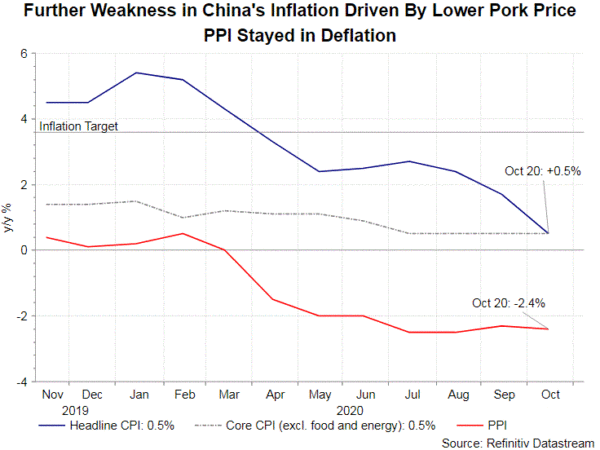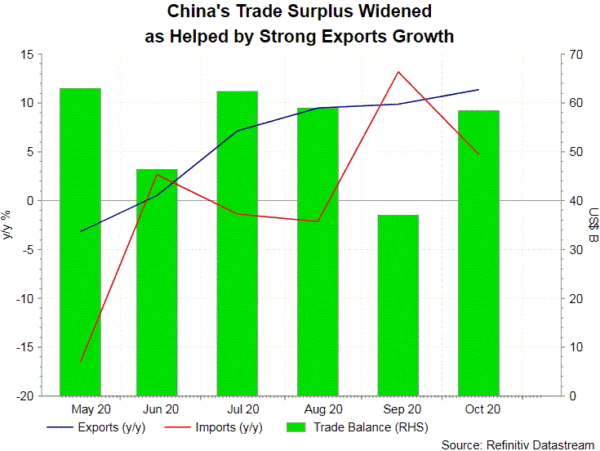China’s inflation moderated in October. Headline CPI eased sharply to +0.5% y/y, from +1.7% a month ago. The decline was mainly driven by food price, of which growth decelerated to +2.2% from September’s +7.9%. Non-food price actually stayed flat at 0%, while core CPI also steadied at +0.5%. Concerning food price, the deceleration was due to pork prices which contracted -2.8% y/y, the first decline since February 2019. Egg price contracted -16.3% y/y. Pork and egg prices together took -0.2 pp away from headline CPI. Fresh vegetable price grew +16.7% y/y decelerating from +17.2% growth in September.
Staying in deflation, PPI contracted -2.1% y/y in October, same as a month ago. Looking into details, price decline for producer goods narrowed 0.1 pp to -2.7%, while that for consumer goods widened 0.4 pp to -0.5%, last month.Again the latter was due to lower food price inflation.
On the whole, we expect headline CPI inflation to slow further in coming months, a result of on continued decline of pork prices and a high base.

Separately, China’s trade surplus widened significantly to US$58.4B in October, from US$37B a month ago. Exports growth accelerated to +11.4% y/y from +9.9% in September. This also beat consensus of +9.2%. Country-wise, exports to the US accelerated to +22.5% y/y in October, from +20.5% a month ago. Exports to Japan returned to +5.7%, following a -2.7% contraction in September. Growth of ASEAN exports almost halved to +7.3%, while shipment EU declined -7%. Reversing growth in previous months, exports of pandemic-related products weakened, For instance, exports growth of textile products (including masks) fell to 16.1% from 36.1% in September. Medical equipment grew +31.6% in October, largely unchanged from +31.3% a month ago.
By contrast, imports expanded +4.7% y/y, easing from +13.2% in September and missing consensus of +8.6%. Slowdown in imports growth was proabyl driven by fewer workings days, due to National Day holiday, and the end of front-loaded chip imports by Huawei in September. In value terms, crude oil imports contracted further by -36% y/y, worsening from -14.1% in September. Meanwhile, imports of integrated circuits moderated to +15.8% from +28.2% in September. Heightened decline of crude oil imports and slower growth of integrated circuit imports were the key drivers of the slowdown of imports growth in China.

